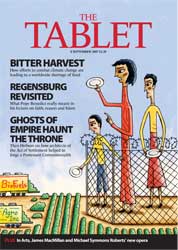There is a killer on the loose in St Petersburg. Its name is cholera, and its accomplices are poverty, slothful bureaucracy and a sanitation system so inadequate that the city is left to stew in its own waste.
The city stinks: nowhere more so than in the office of investigating magistrate Porfiry Petrovich overlooking the excrement-filled Yekaterininsky Canal. Driven to distraction by the swarms of flies, he resorts to lacing bowls of honey with kvas. Once intoxicated, the flies are at his mercy. Murderers, however, prove harder to snare.
R N Morris has breathed new life into the character created by Dostoyevsky in Crime and Punishment and who deduces - despite a singular lack of evidence - that Raskolnikov is the killer he seeks, then leads him to a voluntary confession.
In this, the second of Morris’s Porfiry novels, change is in the air. Investigating magistrates are newly created, as is trial by jury and, as one who Porfiry investigates says disapprovingly, “this emphasis on evidence”. There are the first rumblings of revolt, too. A revolutionary cell may lurk behind the facade of Ballet, the exclusive chocolatier’s; a bomb explodes in a police station.
Porfiry is an engaging companion. With him we are “drawn into the secret heart of St Petersburg” as he seeks the perpetrator of a series of murders in which each victim appears to be dispatched in a way particularly appropriate to their failings and guilty secrets.
He takes us out of the grand, stone-built half of the city, across the wide Neva and into the lowest dives where the poor huddle in darkened cellars; up to their ankles in raw sewage, waiting to die.
As he closes on his killer, Petrovich realises that the crimes, and conditions in the city where they are committed, cannot be separated. “Everything is connected” he concludes. The filth seeps into even the grandest buildings, spreading its malign influence: “a metaphor for something peculiarly Russian.”
Corruption is everywhere. “Who could sleep at night in the summer in St Petersburg, without first exhausting themselves on the streets, wandering the embankments, pacing squares as wide as the days in search of the promise of a passing scent of danger.”
Of course, the killer must be caught, and Morris’s Porfiry shows all the brilliance and cunning of Dostoyevsky’s, but the sense of a far wider wrong hangs over the portrayal of St Petersburg.
As Porfiry’s assistant Vinrinsky says: “Shall I tell you what is a crime...? That people in this city are dying of the cholera when the cause of the disease has been understood for over 10 years.”
(Faber and Faber, £12.99)
